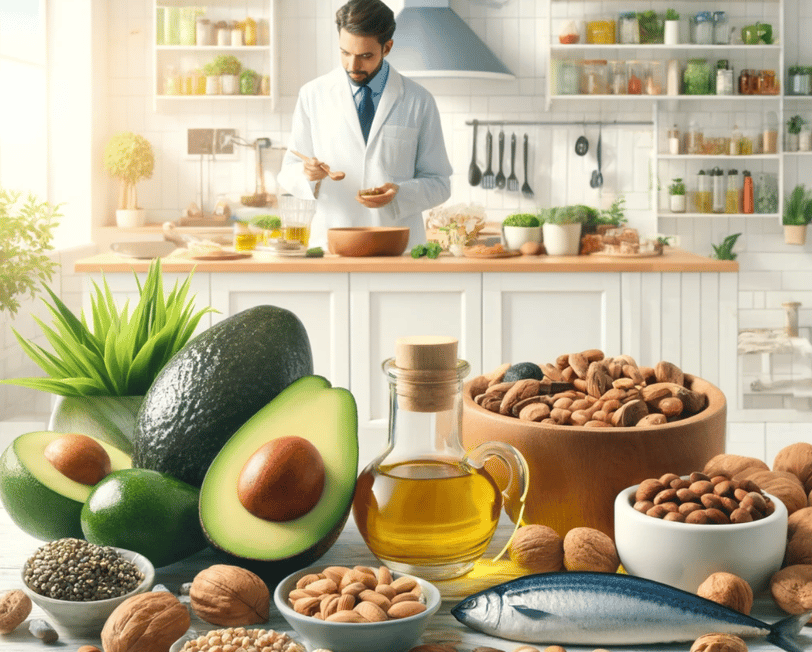Unlocking the Secrets
Of Healthy Fats for Optimal Wellness
5/20/20244 min read


2. Making Smart Choices: Building a Balanced Diet Rich in Healthy Fats
Knowing the different types of fats empowers you to make informed dietary decisions. Here are some practical tips to incorporate healthy fats into your diet:
Limit Saturated Fat Intake:
Choose lean protein sources like skinless chicken, fish, or beans.
Opt for low-fat or fat-free dairy products like yogurt or milk.
Limit processed meats like bacon, sausage, and hot dogs.
Embrace MUFAs and PUFAs:
Include healthy fats from a variety of sources throughout the day.
Drizzle olive oil on salads and vegetables.
Enjoy a handful of nuts or seeds as a snack.
Incorporate fatty fish into your meals 2-3 times a week.
Consider adding flaxseeds or chia seeds to smoothies or oatmeal.
Become a Label-Reading Pro: Be mindful of hidden fats in processed foods.
Pay attention to serving sizes and fat content on food labels.
Avoid pre-packaged snacks and baked goods that are often loaded with unhealthy fats and added sugars.
Cooking with Healthy Fats:
Choose healthy cooking oils like olive oil, avocado oil, or canola oil for stir-frying or sauteing.
Baking with nut butters or applesauce can be a healthier alternative to butter or oil in some recipes.
3. Beyond the Basics: The Functional Benefits of Healthy Fats
The benefits of healthy fats extend far beyond just heart health. Here's a deeper dive into how healthy fats contribute to overall well-being:
Hormone Production: Healthy fats are precursors for several hormones essential for regulating appetite, sleep, and mood. For example, cholesterol is a building block for hormones like estrogen, testosterone, and cortisol. Maintaining healthy fat intake can ensure your body has the necessary resources to produce these hormones at optimal levels.
Brain Health: Omega-3 fatty acids, particularly DHA, are crucial for cognitive function and memory. Studies have shown that adequate omega-3 intake can help protect against cognitive decline and age-related dementia.
Nutrient Absorption: Certain vitamins, like vitamins A, D, E, and K, are fat-soluble. This means they require fat for proper absorption from the digestive tract. Including healthy fats in your meals ensures your body can fully utilize these essential vitamins for various bodily functions.
Skin Health: Healthy fats contribute to maintaining healthy, hydrated skin. They play a role in cell membrane function and can help keep skin supple and elastic.
Unlock a Healthier You with Our Weekly Newsletter!
Healthy fats are a vital component of a balanced diet and a cornerstone of optimal wellness. Our weekly newsletter empowers you to make informed dietary choices and unlock a healthier you.
Don't wait! Take charge of your health and unlock the power of healthy fats. Sign up for our newsletter today and embark on a journey towards a healthier and more vibrant you!
Sign up below and get your FREE Ebook " The HIIT Revolution”
For decades, fat was demonized as the culprit behind weight gain and heart disease. However, recent scientific research paints a much more nuanced picture. Our bodies actually require healthy fats to function optimally. These fats play a vital role in a wide range of physiological processes, from hormone production and cell health to nutrient absorption and brain function. Let's delve deeper and unlock the secrets of healthy fats for optimal wellness.
1. Decoding the Different Types of Fats: Understanding the Good, the Bad, and the Ugly
Not all fats are created equal. Here's a breakdown of the key players and their impact on our health:
Saturated Fats:
Sources: Primarily found in animal products like meat (especially red meat), poultry with skin, full-fat dairy products, and some plant-based sources like coconut oil and palm oil.
The Skinny on Saturated Fat: While our bodies do need some saturated fat for certain functions, consuming too much can raise LDL ("bad") cholesterol levels and increase the risk of heart disease. The American Heart Association (AHA) recommends limiting saturated fat intake to no more than 10% of your daily calories.
Unsaturated Fats: The Dietary Champions
The Two Faces of Unsaturated Fats: There are two main types of unsaturated fats: monounsaturated fats (MUFAs) and polyunsaturated fats (PUFAs). Both are essential for good health and offer numerous benefits.
Monounsaturated Fats (MUFAs):
Sources: Abundant in avocados, olives and olive oil, nuts (almonds, peanuts, cashews), seeds (flaxseeds, chia seeds), and some dark chocolates.
Health Benefits of MUFAs: MUFAs can help lower LDL cholesterol levels while maintaining HDL ("good") cholesterol levels. They also contribute to feelings of satiety, which can aid in weight management.
Polyunsaturated Fats (PUFAs):
PUFAs: A Family Affair: PUFAs are further divided into two subcategories: omega-3 and omega-6 fatty acids. Both are essential for our body, but we need them in a specific ratio (ideally, 1:1 omega-3 to omega-6). Unfortunately, the modern diet tends to be high in omega-6 and deficient in omega-3.
Omega-3 Fatty Acids:
Sources: Fatty fish (salmon, tuna, mackerel, sardines), flaxseeds, chia seeds, and walnuts.
Omega-3 Powerhouse: Omega-3 fatty acids offer a multitude of health benefits, including reducing inflammation, supporting brain function, and protecting against heart disease.
Omega-6 Fatty Acids:
Sources: Vegetable oils (corn oil, sunflower oil, safflower oil), nuts, and seeds. While some omega-6 intake is necessary, excessive consumption can contribute to inflammation.
Trans Fats: The Villain of the Story
Trans Fat Formation: These harmful fats are created through a process called hydrogenation, which adds hydrogen to vegetable oil to make it more solid and extend its shelf life.
Health Risks of Trans Fats: Trans fats are considered the worst type of fat. They raise LDL cholesterol levels and lower HDL cholesterol, significantly increasing the risk of heart disease, stroke, and type 2 diabetes. Thankfully, with increased awareness, trans fats are being phased out of many processed foods. However, it's still important to check food labels and avoid products containing partially hydrogenated vegetable oil or hydrogenated oil.
